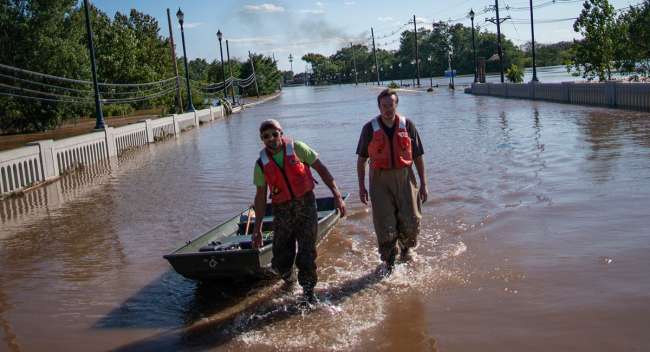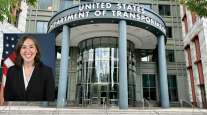Senior Reporter
White House Climate Action Plan Includes USDOT

[Stay on top of transportation news: Get TTNews in your inbox.]
In response to growing concerns associated with severe weather events linked to climate change activity, the U.S. Department of Transportation recently unveiled a comprehensive plan that pursues the administration’s aims for improving infrastructure.
As part of this new climate change adaptation plan, the department detailed a strategy for considering the impact and risks related to climate change, as well as adopting myriad resilience projects and long-term efforts when applicable.
Additionally, the federal transportation leadership would need to incorporate infrastructure resilience into grant-making programs, pursue a resilience agenda during planning and development processes, and ensure facilities and operational assets demonstrate resilience capabilities.
Federal Resilience Plan by Transport Topics
Improvements across climate change education and research also are called for under the plan. This whole-of-government guidance was unveiled months after the White House announced it would prioritize climate change strategies for responding to the effects of severe weather events on mobility corridors.
“The climate crisis is here today, threatening Americans’ lives and livelihoods, our homes and businesses, and even the way we travel and operate our federal agencies,” Transportation Secretary Pete Buttigieg said Oct. 7. “While we work to reduce greenhouse gas emissions and prevent the worst outcomes of climate change, the U.S. Department of Transportation’s plan will help ensure that our transportation infrastructure, policies and programs will be more resilient to the climate impacts already facing our country.”
According to steps outlined in the department’s plan: “Transportation projects that do not incorporate resilience into their design, construction and siting are at risk for damage, deterioration and destruction from impacts of climate change. This risk could mean relocating or even abandoning current infrastructure in certain circumstances.”
“Without adequate protections, federal investments are placed at risk, the safety of transportation systems can be compromised, and an efficient transportation system will be disrupted, impeding the efficient movement of freight and the traveling public,” per the plan.
We will implement five priority adaptation actions to increase climate preparedness of programs and the management of federal procurement, real property, public lands, and waters, and financial programs. Learn more:https://t.co/HIt9OUiGOE — TransportationGov (@USDOT) October 7, 2021
The Biden White House emphasized the Transportation Department also is prepared to consider the impact that heat, poor air quality and vector-borne disease have on disadvantaged communities. Addressing long-standing inequalities nationwide is a pillar of the plan’s objective.
As the White House put it, “Climate change and its impacts may exacerbate existing health and socioeconomic inequities, placing certain populations at particular risk. To tackle this challenge, agencies outlined their actions in support of this administration’s environmental justice objectives.”
In addition to DOT, the plan targets the departments of Commerce, Agriculture, Defense, Education, Energy, Health and Human Services, Homeland Security, Housing and Urban Development, among others.
“Our world is facing a climate crisis that poses existential threats and demands urgent action. We must act now,” said Homeland Security Secretary Alejandro Mayorkas. “The DHS Climate Action Plan outlines how our department will remain mission-resilient to climate change while reducing our own impact on the environment, including by electrifying our vehicle fleet, educating our workforce on the importance of adaptation and resilience, and leveraging grant programs to incentivize investments in disaster resiliency.”
This week @CommerceGov released its Climate Action Plan for Adaptation and Resilience to deliver reliable and timely climate information and services to help American communities adapt to climate change.
Discover more https://t.co/dVBwy0GBYw — U.S. Commerce Dept. (@CommerceGov) October 9, 2021
“This is a once-in-a-generation opportunity for the United States to develop and produce advanced technologies, export them around the world, and speed global net-zero transitions,” added Commerce Secretary Gina Raimondo. “This work will ultimately lead to good-paying jobs and better technology for the world’s fight against climate change.”
The administration, via the Council on Environmental Quality, is seeking public feedback regarding the plan.
Want more news? Listen to today's daily briefing below or go here for more info:




